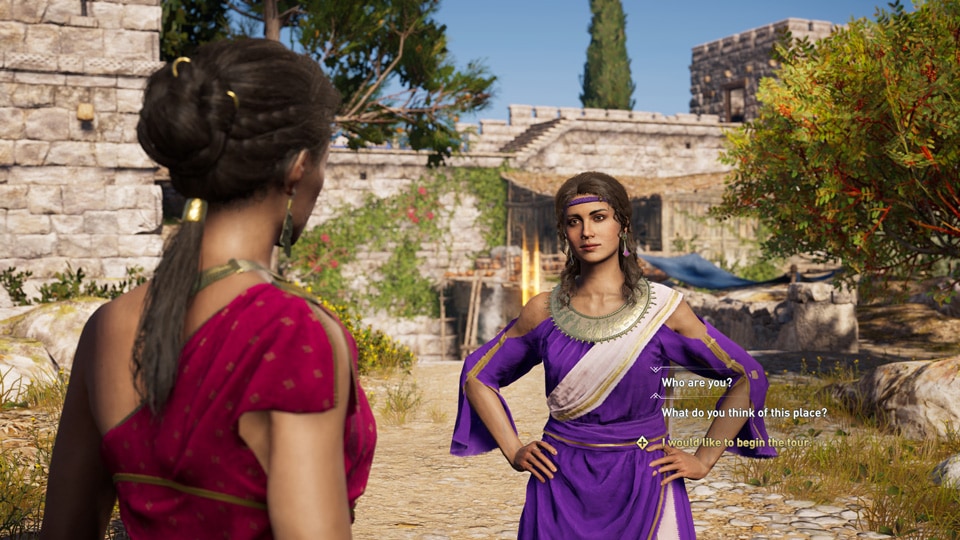It's 3 o'clock on a hot Wednesday afternoon in Richmond, California. Most Kennedy High School students have begun making their way off campus, but a group of 25 or so heads over to the school's state-of-the-art fabrication lab. These students aren't here for the average after-school activity (which, in the "Fab Lab," could consist of 3D-printing chainmail or laser-cutting wooden pendants); today, they'll be busy exploring Ancient Hellas through Discovery Tour: Ancient Greece.

The afternoon starts off with a presentation from Assassin's Creed's resident historian, Maxime Durand. Surprisingly, Durand's remarks aren't focused on the content of Discovery Tour, but rather the work, research, and methods of making a videogame. The educators in the room want to show how nearly anyone, regardless of their field of study, can work in videogames and tech. In this case, Durand is a prime example of how history can have realistic applications for game development.
"Discovery Tour was meant to be in players', students', and teachers' hands," says Durand after the event. "It was such a nice opportunity for me to be able to present it, get students to try it, and see their smiles while they're learning history through a videogame. I hope Discovery Tour helps kids figure out that they like to learn. I hope they learn that history is rich and powerful, and I hope it allows them to project themselves into a future career in videogames, because they can see there's real research behind these games."
The smiles Durand referenced were evident throughout the 60-minute hands-on session. With all of Discovery Tour's Ancient Greece at their fingertips, every student group took a different path through the world, pausing only to jot down notes and answers on Durand's optional worksheet. Students weren't the only ones surprised and engaged by Discovery Tour's level of detail and historical accuracy.
"I definitely think Discovery Tour has value educationally and pedagogically," says Matthew Duffy, superintendent of the West Contra Costa Unified School District. "I could see Discovery Tour becoming integrated into classrooms. When you're trying to make ancient history really come to life, to allow students to really get into that context and that world, I think this is a really engaging way to do it. We're concerned with trying to create educational experiences here that are engaging, empowering, and challenging, and I think this fits those three."

While Duffy sees potential in Discovery Tour as a tool for the classroom, 10th grade world history teacher Tanner Kamphefner has already experimented with bringing last year's iteration – Discovery Tour: Ancient Egypt – into his classroom.
"We're covering Alexander the Great right now, so we used Discovery Tour: Ancient Egypt to show his conquest throughout Asia Minor and into Egypt, and the founding of Alexandria," says Kamphefner. "For about 30 minutes, we took tours through Alexandria in Discovery Tour. It was a really cool way for the students to get more immersed in the world. They had never thought of using a videogame to learn history. Once they got into it, they saw topics, locations, and buildings we had talked about in class, and it really drew them in. Today, they came into class asking about it. I even have a couple kids asking to stay after school to try it."
Following the session, the students and teachers sat back down with Durand for a Q&A session, and it was evident that Discovery Tour was every bit as engaging as Duffy hoped. One teacher remarked that the students seemed completely engrossed, evidenced by the fact that she didn't see any of them on their phones or asking to be excused to use the restroom during the entire 60-minute session. When it came to Durand's optional worksheet, nearly every student group completed multiple questions, with one student noting that they never would've answered so many had they been using a textbook.
Perhaps most surprising were the opportunities teachers saw to teach things that are difficult to convey through conventional means. "I really like the geography aspect of it, because that's something that's really hard to teach in the classroom," says Joanne Chen, 6th grade history teacher at Mira Vista Middle School. "We always start a unit by talking about the geography of the land, and that's hard to teach in a book when you only have a single photo. Discovery Tour gives you a holistic sense of what it looked like."

Similarly, Jim Hollis, the executive director of Calculus Roundtable – a nonprofit organization that promotes alternative pathways to math and sciences for students of color – thinks that Discovery Tour presents an opportunity to teach subjects outside of history.
"I'm actually really impressed with the possible math aspects of it," says Hollis. "I heard students talking about the heights of statues and buildings and the distances between places. Any time you can have this kind of 100% engagement with students, it's an opportunity to teach them lots of things."
It was difficult to walk away from the event without feeling like the surface had only just been scratched for the potential educational value of Discovery Tour. Yet despite all the excitement, Durand is adamant that it's just another tool for educators, and not a replacement for more traditional educational mediums.
"We're not competing with teachers or textbooks; we're trying to offer an additional tool for education," says Durand. "There are books and movies that have been used for decades, and now we're another medium that's there for them to use. Our goal is just to engage students much more actively than any of the more traditional mediums, and encourage critical thinking in a different way."
For more on how to use Assassin’s Creed Origins Discovery Tour, check out the Ubisoft support site.



